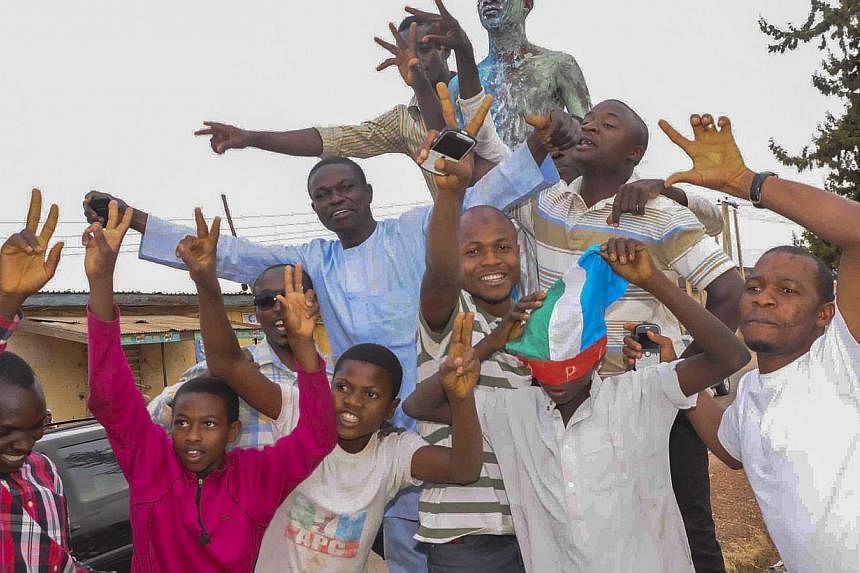ABUJA (AFP) - Main opposition candidate Muhammadu Buhari won Nigeria's presidential election by 2.57 million votes, according to official results announced on Wednesday.
The Independent National Electoral Commission (INEC) said the 72 year old, from the All Progressives Congress (APC), won 15,424,921 votes, or 53.95 per cent of the 28,587,564 total valid votes cast.
His nearest rival, President Goodluck Jonathan, 57, of the Peoples Democratic Party (PDP), won 12,853,162 (44.96 per cent) at the election, which was held on Saturday and Sunday.
INEC chairman Attahiru Jega said: "Muhammadu Buhari, of the APC, having satisfied the requirement for the law and scored the highest number of votes is hereby declared the winner and is returned elected."
The victory writes a new chapter in the country's often-turbulent history after six military coups since independence in 1960 and 16 years of unbroken civilian rule by Mr Jonathan's party.
The gripping contest also capped a remarkable transformation for 72-year-old former army general Buhari, who led a tough military regime in the 1980s but now describes himself as a "converted democrat".
Thousands spilled onto the streets of northern Nigeria's biggest city, Kano, in celebration, shouting campaign slogan "Sai Buhari" ("Only Buhari") as he took an unassailable lead with one state to declare.
Many brandished brooms, Gen Buhari's party symbol, with which they have pledged to sweep away years of government waste and corruption.
In another northern city of Kaduna - the scene of rioting after the 2011 presidential election - supporters of his All Progressives Congress (APC) chanted: "Change! Change!"
The election was hit by glitches in new voter technology and claims of irregularities, after being delayed by six weeks due to concerns of attacks by Boko Haram insurgents.
But with dissatisfaction rife over Nigeria's security, corruption and the economy faltering as oil revenues dived, voters turned out in force sensing an unprecedented opportunity for change.
In the financial hub of Lagos, in the south-west, Buhari supporters celebrated wildly, some of them on horseback, with fireworks exploding into the night.
"This is the first democratic change ever in Nigeria," Mr Anas Galadima told AFP, as thousands thronged the APC headquarters in the capital Abuja, dancing and banging drums.
"It's not about Muslim or Christian or any party. It's about politicians knowing that if you don't do the job, we can kick you out.
"I haven't been this excited since the night of Barack Obama's election."
Political commentator Chris Ngwodo said the victory had "instigated the supremacy and primacy of the electorate" in a country where elections had generally been a foregone conclusion for the incumbent.
"The dynamics between the governed and government has changed for good," he said.
Gen Buhari won because, backed by a strong and well-organised party machine, he had managed to secure national support in a nation split between a largely Muslim north and mainly Christian south, Mr Ngwodo added.
Mr Jonathan conceded in a telephone call to Gen Buhari at 5.15pm even before the final results were declared, earning him praise from politicians of all stripes.
"I promised the country free and fair elections. I have kept my word," he said later, urging disputes over the results to be settled in court rather than on the street.
"Nobody's ambition is worth the blood of any Nigerian," he added.
Gen Buhari has accused Mr Jonathan of a failure of leadership in tackling the Boko Haram insurgency, which over six years has left more than 13,000 people dead and some 1.5 million people homeless.
Military gains against the militants in recent weeks were welcomed but seen as too little, too late by voters after so much bloodshed.
Initial results indicated Gen Buhari had won 94 per cent of the vote in Borno state - the region worst affected by the Islamists' rampage and from where more than 200 schoolgirls were abducted in April last year.
Hundreds of thousands of people defied threats of suicide attacks and bombings to vote, with polling stations set up in camps for people displaced by the conflict in state capital Maiduguri.
Buhari, a Muslim, won massively in the violence-hit north but also made crucial gains elsewhere, including Lagos, which had been targeted by both sides as a swing state.
Mr Jonathan at one point clawed back the deficit to some 500,000 votes after winning near total support in his home state of Bayelsa and neighbouring Rivers.
But it was not enough to seize back the momentum and with eight states to declare, most of them in the north, APC spokesman Lai Mohammed called victory.
"This is the first time the opposition has voted a government out of power in Nigeria's history," he told AFP.
Gen Buhari has acknowledged that he cannot perform miracles, with poverty widespread among Nigeria's 173 million people, the ongoing threat from Boko Haram and the oil-dependent economy stalling.
But with his military background, the former leader was seen as a better bet to fight the insurgents, while he has cast himself as an anti-corruption crusader - despite excesses and abuses during his military rule.
He has vowed to lead by personal example, pledging: "Corruption will have no place and the corrupt will not be appointed to my administration."
But he has rejected PDP charges that he is unchanged from his days in the military, where he fell foul of rights groups in his pursuit of corrupt officials and general "indiscipline".
"Before you is a former military ruler and a converted democrat who is ready to operate under democratic rules," he said in February.

